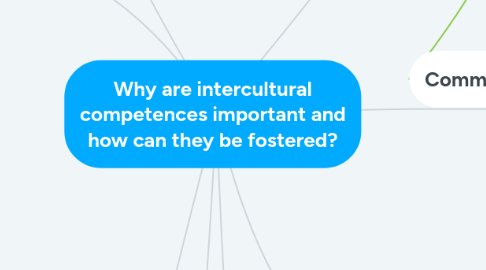
1. ICC
2. Intercultural communicative competence
2.1. In school
2.1.1. interpreting and relating-> relating texts to a culture
2.1.2. attitudes-> create curiosity about other cultures (texts, brainstorming , visual aids) -> Texts about lives of people in other cultures
2.1.3. skills of discovery and interaction-> virtual encounter, negotioton of cultural misunderstandings
2.1.4. knowledge -> working with stereotipes, autostereotypes
2.1.5. 4C's: - communicaiton -cognition -content -culture
3. Intercultural competence is the ability to develop targeted knowledge, skills and attitudes that lead to visible behaviour and communication that are both effective and appropriate in intercultural interactions.
3.1. Knowledge
3.1.1. Cultural self awareness
3.1.2. culture specific knowledge
3.1.3. socio-linguistic awareness
3.1.4. global issues and trends
3.2. skills
3.2.1. listening, observing,
3.2.2. evaluating
3.2.3. patience
3.2.4. viewing the world from other perspectives
3.2.5. interpret and relate
3.2.6. discover and/or interact
3.3. attitudes
3.3.1. openness
3.3.1.1. withholding judgement)
3.3.2. Respect (valuing other cultures);
3.3.3. curiosity (viewing differences as learning opportunities)
3.3.4. tolerance
3.4. education
3.4.1. political education
3.4.2. critical cultural awareness
4. material
4.1. new inspiration culture part
4.2. authentic materials
4.2.1. BBC teaching english
4.2.2. radio/ audio/ potcasts
4.3. critical incidents
5. Conclusion
5.1. learning explicit
5.2. providing real experiences and/or authentic material
5.3. how can you messure something like awareness? -> affective learning goals
6. Why
6.1. globalisation
6.1.1. interaction on a world wide basis
6.1.2. job
6.2. understanding
6.2.1. culture
6.2.2. behaviour
6.3. learning more than language
6.3.1. When using which form-> register
6.4. Lehrplan 21
6.4.1. Kulturen im Fokus A|Kenntnisse - Die Schülerinnen und Schüler kennen einige Merkmale des englischsprachigen Kulturraums sowie kulturelle Gemeinsamkeiten und Unterschiede. B|Haltungen - Die Schülerinnen und Schüler können über ihre Haltung gegenüber dem englischsprachigen Kulturraum und gegenüber kultureller Vielfalt nachdenken. C|Handlungen - Die Schülerinnen und Schüler begegnen Menschen und Erzeugnissen des englischsprachigen Kulturraums virtuell und real.
7. Common European Framework (CEF)
7.1. ICC is main goal of foreign language learning
8. Communicative competence
8.1. sociocultural competence
8.1.1. social rules of language use -> conventions, content, politeness, nonverbal futures of language use
8.2. strategic competence
8.2.1. coping strategies
8.3. discours
8.3.1. ability to connect a number of utterances to form a meaningful oral or written text
8.4. grammatical comp.
8.4.1. lexical, morphological, syntactical, phonological features of language
8.5. mediation
8.5.1. support in understanding social conventions and rules of a language and a culture
